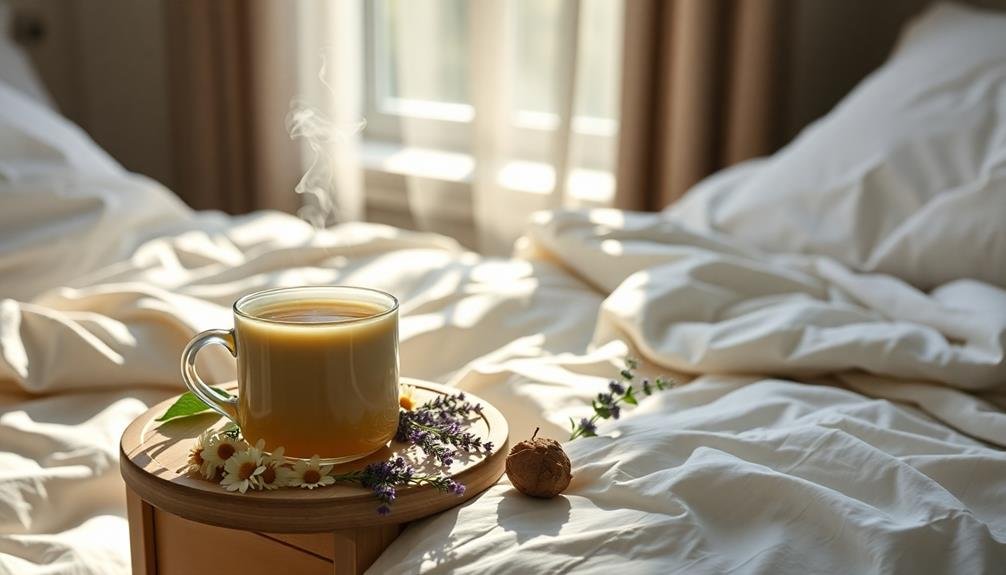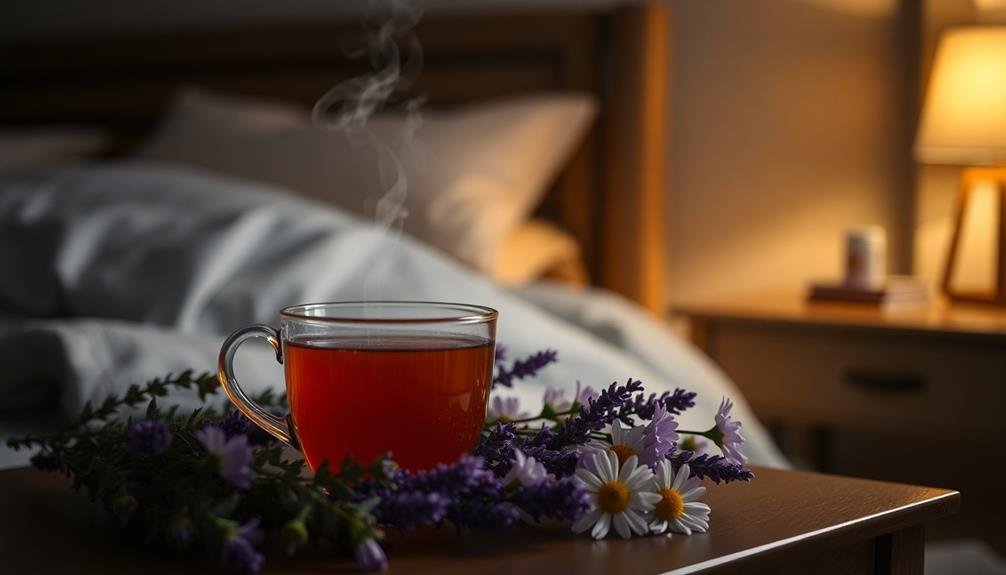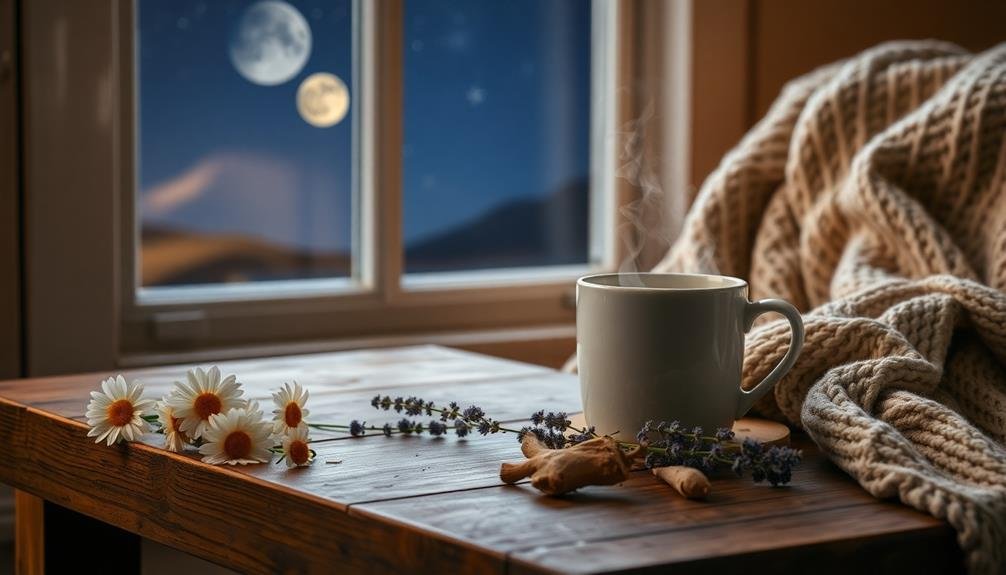Natural sleep teas outperform prescription alternatives due to their gentle, non-addictive nature. You'll find these herbal blends promote relaxation without harsh side effects or dependency risks. Unlike prescription medications, sleep teas offer hydration and leave you feeling refreshed upon waking. Common ingredients like chamomile, valerian root, and lavender work together to enhance sleep quality naturally. While prescriptions can lead to tolerance and altered brain chemistry, herbal remedies support your body's natural sleep-wake cycle. With fewer side effects and long-term effectiveness, natural sleep teas provide a safer, more sustainable solution for improving your sleep health. Discover how customizing your blend can further enhance these benefits.
Benefits of Natural Sleep Teas

Natural sleep teas offer three key benefits for those struggling with sleep issues.
First, they're gentle on your system, unlike prescription sleep aids that can cause dependency or harsh side effects. You'll wake up feeling refreshed, not groggy or disoriented.
Second, these teas contain natural compounds that promote relaxation and sleep. Ingredients like chamomile, valerian root, and lavender have been used for centuries to calm the mind and body. They work with your body's natural sleep cycle, helping you drift off more easily and stay asleep longer.
Third, the ritual of preparing and sipping tea can be a calming bedtime routine. This process signals to your brain that it's time to wind down, making it easier to shift into sleep mode. Plus, you're staying hydrated without consuming caffeine or alcohol, which can disrupt sleep patterns.
Common Ingredients in Sleep Teas
When you're looking for a natural way to improve your sleep, certain herbs stand out as common ingredients in sleep teas.
You'll often find chamomile, known as nature's sleep aid, which has been used for centuries to promote relaxation and better sleep.
Other popular ingredients include valerian root, prized for its sedative effects, and lavender, which is renowned for its calming properties.
Chamomile: Nature's Sleep Aid
For centuries, chamomile has reigned as one of the most popular herbal ingredients in sleep teas. This gentle herb offers a mild, apple-like flavor and a host of benefits that can help you drift off to sleep naturally. Chamomile contains apigenin, an antioxidant that binds to specific receptors in your brain, potentially reducing anxiety and initiating sleep.
You'll find that chamomile tea can help relax your muscles and calm your nerves, creating an ideal state for sleep. It's also known to reduce inflammation and soothe digestive issues, which can often interfere with a good night's rest.
Unlike prescription sleep aids, chamomile doesn't come with the risk of dependency or harsh side effects. When you're looking for a natural sleep aid, chamomile tea should be at the top of your list. It's safe for most people and can be consumed regularly without worry.
You can even combine it with other sleep-promoting herbs like lavender or valerian root for enhanced effects. Remember, consistency is key – try incorporating a cup of chamomile tea into your nightly routine for the best results.
Valerian Root's Sedative Effects
Digging deeper into the world of natural sleep aids, we encounter valerian root, a potent herb known for its sedative properties. This perennial plant has been used for centuries to promote relaxation and improve sleep quality. You'll find valerian root in many sleep teas, often combined with other calming herbs.
Valerian root works by increasing the levels of gamma-aminobutyric acid (GABA) in your brain. GABA is a neurotransmitter that helps regulate nerve impulses, promoting a sense of calm and reducing anxiety.
When you consume valerian root tea, you're likely to experience a gentle sedative effect that can help you fall asleep faster and enjoy more restful slumber.
Unlike some prescription sleep medications, valerian root doesn't typically cause morning grogginess or dependency. However, it's essential to recognize that the herb's effects can vary from person to person. Some may find immediate relief, while others might need to use it consistently for a few weeks to notice improvements in their sleep patterns.
If you're considering valerian root tea as a sleep aid, it's wise to consult with your healthcare provider, especially if you're taking other medications.
Lavender's Calming Properties
Among the most beloved ingredients in sleep teas, lavender stands out for its gentle yet effective calming properties. You'll find that this fragrant herb not only adds a pleasant aroma to your tea but also helps soothe your mind and body, preparing you for a restful night's sleep.
Lavender contains linalool, a compound known for its anxiolytic (anti-anxiety) effects. When you consume lavender tea, this compound interacts with GABA receptors in your brain, promoting relaxation and reducing stress. Studies have shown that lavender can improve sleep quality, increase sleep duration, and help you fall asleep faster.
You'll also benefit from lavender's ability to lower heart rate and blood pressure, further enhancing its sleep-promoting effects. Unlike some prescription sleep aids, lavender doesn't cause grogginess or dependency, making it a safe and natural option for long-term use.
To maximize lavender's benefits, steep it with other complementary herbs like chamomile or passionflower. You can also combine it with a bedtime routine, such as reading or meditation, to create a powerful sleep-inducing ritual that'll have you drifting off to dreamland in no time.
Potential Side Effects of Prescriptions

When considering prescription sleep aids, you should be aware of potential dependency and tolerance issues.
Over time, your body might become accustomed to these medications, requiring higher doses for the same effect.
Additionally, you may experience morning grogginess, which can impact your daily activities and productivity.
Dependency and Tolerance Issues
While prescription sleep medications can be effective in the short term, they often come with the risk of dependency and tolerance issues. You might find yourself needing higher doses to achieve the same sleep-inducing effects over time. This can lead to a dangerous cycle of increased consumption and potential addiction.
Unlike natural sleep teas, prescription sleep aids can alter your brain chemistry, making it difficult for you to fall asleep without them. You may experience withdrawal symptoms when trying to stop, such as rebound insomnia, anxiety, and irritability.
Here's a comparison of dependency and tolerance issues:
| Prescription Sleep Aids | Natural Sleep Teas |
|---|---|
| Risk of physical dependence | No physical dependence |
| Tolerance buildup | No tolerance buildup |
| Withdrawal symptoms | No withdrawal symptoms |
| Potential for addiction | Non-addictive |
| Altered brain chemistry | Natural sleep support |
Morning Grogginess Concerns
A common complaint among prescription sleep aid users is the lingering grogginess experienced the following morning. This "hangover effect" can considerably impact your daily activities, leaving you feeling sluggish, unfocused, and less productive. Prescription sleep medications often have longer half-lives, meaning they remain active in your system well into the next day.
In contrast, natural sleep teas typically don't cause this morning grogginess. The herbs used in these teas, such as chamomile, valerian root, and passionflower, work with your body's natural sleep-wake cycle. They gently promote relaxation and sleep without the harsh, lingering effects of synthetic drugs.
You'll likely wake up feeling more refreshed and alert after drinking sleep-promoting teas. This is because they don't interfere with your sleep architecture the way some prescription medications can. Natural teas support a more restorative sleep, allowing you to progress through sleep cycles naturally.
Moreover, you can adjust the strength of your tea to suit your needs, reducing the risk of oversedation. This flexibility isn't possible with prescription pills, which come in fixed doses that may be too strong for some individuals.
Safety Profile of Herbal Remedies
Considering the widespread use of herbal sleep remedies, it's vital to understand their safety profile. Unlike prescription sleep aids, natural teas generally have fewer side effects and a lower risk of dependency. However, this doesn't mean they're entirely without risks.
You should be aware that some herbal ingredients can interact with medications or cause allergic reactions. For instance, chamomile may interact with blood thinners, while valerian root can increase the effects of sedatives. It's important to consult your healthcare provider before incorporating herbal sleep teas into your routine, especially if you're pregnant, nursing, or taking other medications.
Most herbal sleep teas are considered safe when consumed in moderation. However, excessive use can lead to unwanted effects such as headaches, nausea, or daytime drowsiness.
You should also be cautious of potential contaminants in some herbal products. Choose reputable brands and look for third-party testing certifications to guarantee quality and safety.
Long-Term Effectiveness Comparison

When comparing the long-term effectiveness of natural sleep teas to conventional sleep aids, it's important to look beyond short-term results. Natural sleep teas offer sustained benefits without the risk of dependency or tolerance buildup often associated with prescription medications.
You'll find that herbal remedies work with your body's natural processes, promoting overall sleep health rather than forcing sleep. This approach leads to more consistent, quality rest over time. Unlike pharmaceutical options, you won't experience diminishing returns or need to increase dosage.
Consider these key differences:
| Factor | Natural Sleep Teas | Prescription Sleep Aids |
|---|---|---|
| Tolerance | No buildup | May require increased dosage |
| Side Effects | Minimal | Can be significant |
| Dependency | Non-habit forming | Risk of addiction |
| Morning Grogginess | Rare | Common |
| Long-term Health | May improve overall wellness | Potential long-term risks |
Customizing Your Sleep Tea Blend
Tailoring your sleep tea blend to your specific needs can greatly enhance its effectiveness. You'll find that combining different herbs can address multiple sleep issues simultaneously. For instance, if you're dealing with both anxiety and insomnia, a blend of chamomile and valerian root might be ideal. Experiment with various combinations to discover what works best for you.
When creating your custom blend, consider the following factors:
- Your primary sleep issue (difficulty falling asleep, staying asleep, or both)
- Any underlying conditions affecting your sleep (stress, anxiety, pain)
- Your taste preferences
- The time of day you'll be drinking the tea
Start with small batches and adjust the proportions as needed. You might find that a stronger concentration works better, or that a milder blend is more palatable.
Don't be afraid to incorporate non-traditional ingredients like rose petals or lemon balm for added flavor and benefits. Remember, the goal is to create a tea that you'll enjoy drinking regularly, as consistency is key to reaping the long-term benefits of natural sleep aids.
Frequently Asked Questions
How Long Before Bedtime Should I Drink Sleep Tea for Optimal Results?
You'll want to drink your sleep tea about 30-60 minutes before bedtime. This gives your body time to absorb the calming compounds. Don't wait too long, though, or you might need to use the bathroom overnight.
Can I Mix Sleep Teas With Other Sleep Aids or Medications?
You shouldn't mix sleep teas with other sleep aids or medications without consulting your doctor. It's risky to combine different substances that affect sleep, as they could interact unpredictably. Stick to one method or seek professional advice.
Are There Any Age Restrictions for Consuming Natural Sleep Teas?
While there aren't strict age restrictions for natural sleep teas, you'll want to be cautious with children and teens. It's best to consult a pediatrician before giving them sleep teas. For adults, you're generally safe to consume them.
Can I Become Dependent on or Develop Tolerance to Sleep Teas?
You're unlikely to become physically dependent on sleep teas, but you may develop a psychological reliance. Tolerance is possible with regular use, so it's best to vary your routine and avoid relying solely on teas for sleep.
How Do Sleep Teas Affect the Quality of Dreams or REM Sleep?
You'll likely experience more vivid dreams as sleep teas can enhance REM sleep. They won't disrupt your sleep cycles like some medications. You might remember your dreams better, but they shouldn't cause nightmares or sleep disturbances.
In Summary
You've seen how natural sleep teas offer a gentler, safer approach to improving your rest. They're customizable, have fewer side effects, and can be just as effective as prescription options in the long run. While everyone's needs differ, you might find that a calming cup of herbal tea becomes your nightly ritual. Give natural sleep teas a try – you could discover a soothing solution that helps you drift off peacefully without relying on pharmaceuticals.





Leave a Reply